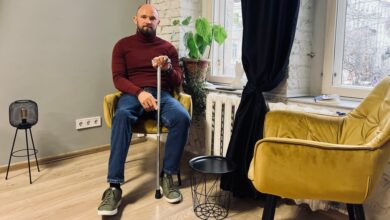Health research at Pride events aims to broaden knowledge about chronic conditions
Researchers hope that LGBTQ people celebrating at Pride festivals will take 15 minutes during the revelry to share information about their health and experiences with health care and social services.
The Community-Based Research Center (CBRC) is sending researchers from LGBTQ and two-spirit communities to more than 20 Pride events across Canada to collect data for the “Our Health” study, with a focus on chronic diseases such as diabetes, cancer and fibromyalgia.
The experiences of transgender, gay, bisexual, lesbian, gay and two-spirited people living with chronic illnesses, including the impact of COVID-19 and their access to services, are underrepresented in health research, said Anu Radha Verma, chronic health research business manager at CBRC.
“When we’ve talked about queer and trans and two-spirit health for so long, we’ve only talked about sexually transmitted and blood-borne diseases,” Verma said.
“We really need to talk about all these extra dimensions of our health as well.”
The survey also asks participants how they cope with health issues, including whether their health costs are covered by public or private insurance, she said. They are also asked about substance use and experiences with discrimination.
The survey responses are anonymous and confidential, Verma said.
The CBRC did a survey on “Our Health” last year, but it was all online and took 30 minutes to an hour to complete. This year’s survey only takes about 15 minutes and it’s the first time researchers have gone to Pride events to recruit participants, she said.
Having high-quality health data is critical to identifying the types of changes needed in health care and social services, as well as developing prevention programs and securing funding, Verma said.
“When we look at the resources that are out there, whether it’s public education campaigns or groups and stuff, we don’t really see queer and trans and two-spirit people represented in that,” she said.
“So there’s an opportunity for our chronic disease strategies to be more attuned to the lives of queer and transgender and two-minded people.”
Conducting the survey itself is also important for ensuring LGBTQ communities have a voice in health care, said Alphonso King Jr., a Toronto community leader, activist and drag queen known as Jade Elektra.
“It’s no different than a person of color seeing themselves represented on television or in film or whatever,” King said.
“When you really realize that people recognize that you exist, that’s so important.”
While Toronto’s Pride weekend, which begins on Friday, is largely a “party atmosphere,” King encourages people to take the time to participate in the research.
“If you have a chance to take the survey, please do, because your information is just as important as everyone else’s and it can actually shape and change the way things are done in the future,” said King.
The CBRC is aiming to get about 10,000 people across Canada to complete the survey, Verma said, noting that the reception has been positive at Pride events they have already attended in Winnipeg, Regina and Saskatoon.
Nearly 800 people participated in Pride Winnipeg alone, she said.
People can scan a QR code and take the survey on their phone, or they can use tablets provided at the event, Verma said. It can be done in English, French or Spanish and participants receive a $10 fee.
The “Our Health” survey is an important way to build trust between LGBTQ2S communities and the health care system and drive improvement, said Daniel Grace, Canada Research Chair in Sexual and Gender Minority Health and associate professor at Dalla Lana School of Public Health at the University of Toronto.
“We know that many people experience health care in a very negative way because of transphobia and homophobia, because of anti-black and anti-Indigenous racism,” said Grace, a former board member and a contributing researcher for CBRC.
“It is essential that we not only collect information to better assess barriers to health services, but that we act on them, mobilize for them, hold healthcare providers and governments accountable,” he said.
The “Our Health” research team will be present at Pride events this summer:
In June: Toronto and Steinbach, Man..
In July: Victoria; Sudbury, Ontario; Fredericton, NB; Halifax, NS; Charlotte City.
In August: Bathurst, NB; Vancouver; Saint John, NB; Montreal; New Westminster, BC; Edmonton; Ottawa; Sherbrooke, Que.; Calgary; St John’s.
In September: the city of Quebec.
This report from The Canadian Press was first published on June 22, 2023.
Canadian Press health coverage is supported by a partnership with the Canadian Medical Association. CP is solely responsible for this content.




